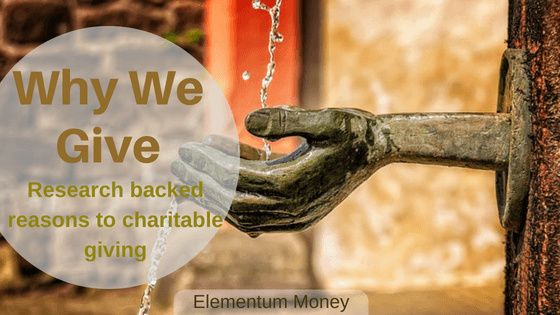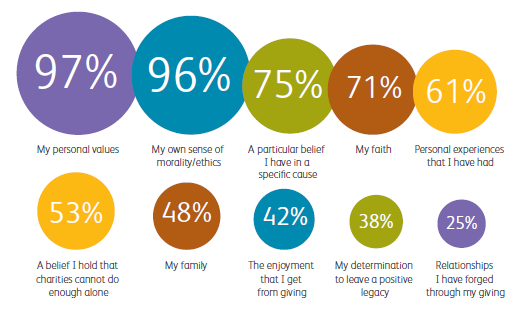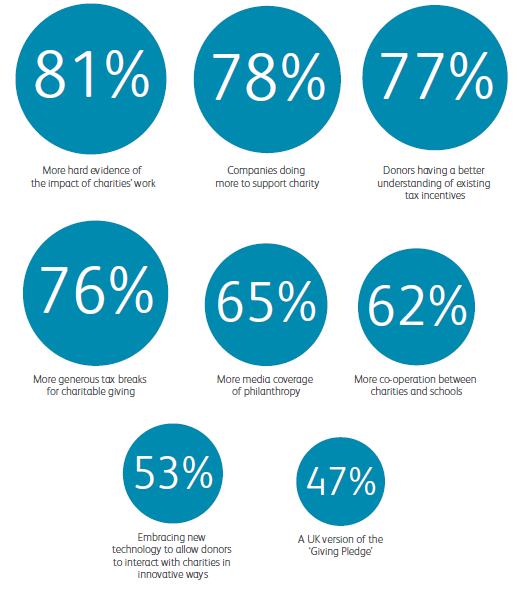
One of the best jobs that you can give to your money? Improving the lives of others, right? However, most charities still struggle to raise enough money to make the impact they are capable of. Considering the suffering and impoverishment in the world, I don’t think there can ever be too much of giving to a good cause.
I used to give a tiny amount as a part of payroll giving. However, I changed my job and the giving stopped. By next month, I aim to start the practice of automatic monthly giving again as the same payroll giving partner has the option of automatic debiting of the amount from individual bank accounts.
Lately, I became aware of the amount of research that now happens when it comes to charitable giving. Considering it is so relatable, they make for an interesting, thoughtful and thought-provoking read. My first brush with such research was when I had a chat with Debra Mesch, the Director of Lilly Family School of Philanthropy.
About the study
Today, I wanted to talk more about another interesting research that I came across – Why We Give research by Charities Aid Foundation. Charities Aid Foundation is a UK-based organization that connects charities with donors, with offices in 9 countries across the world, including India. While the research is slightly dated, I believe for such universal values, very little changes over such a period of time.
722 Charities Aid Foundation customers completed the online survey which provides a rich database of responses to base the findings on. All text in italics are quotations taken from the survey report.
Why they give
The main question asked was to understand the underlying reason behind people’s habit of giving to charitable purposes. The findings of the question are summarised in the image below:

Why do people give to charity? Source: Charities Aid Foundation
Personal value and sense of ethics
The most important reason that most people seemed to relate to was – personal value and sense of ethics. They felt it was their duty to use their own good fortune to help others who are not so fortunate.
While I have always felt that the possibility of feeling like that is higher in a country like India, where we live in a sea of impoverishment, on a recent trip to the US I realized that even in Western countries today, there is a growing need for charitable giving. I saw enough homeless people who could benefit from our generosity.
As one of the respondents is quoted in the study – Being able to give is a privilege – there’s nothing better than putting a smile on someone’s face and giving money is a great way to do that.
Passion for a cause
Passion drives a lot of things, including seemingly, charitable giving. If you are passionate about a cause, you will try to give your money or time to it. For instance, during my payroll giving, I used to sponsor mid-day meals for 2 girls in a village, which is the meal given to them in school. In India, mid-day meals are a huge incentive for the poor to send their kids to school. This cause seemed to intersect two of the things I feel strongly about – education for the girl child and food for the impoverished.
What do you feel strongly about? If you were to give, what cause would you give to?
Most of the time, we think we can’t give enough for charities. A phrase we’ve been thinking about lately when it comes to the environment is: ‘think globally, act locally’. And I think the same thing must apply to giving.
Religious giving
Most religions propagate a habit and culture of giving or donations. If you are religiously inclined, you would take the religious mandate of giving seriously.
Religious giving remains big today. Personally, while I am spiritual, I am not much for institutionalized religions and prefer secular giving. However, if religious teaching motivates you to give, then use that as a guiding principle to inculcate that habit.
If you have some of the good things in life, it is important to consider helping those who don’t. We encouraged our two children to give to charity and used to get them to put a small amount of their pocket money in the church collection box each week so that they were encouraged to be generous from an early age. From my experience as a church treasurer, I am led to believe that people do not give much and people are quick to use the financial crisis and their own disadvantages as an excuse not to give, even if they may be very well off compared to those in need. It’s a shame, as they are missing out on the warm feeling you get from knowing that your money is having an impact.
Personal experiences I have had
A number of respondents talked about how they started investing after a personal experience that they might have had. This included looking at impoverishment first hand especially in third world countries or having suffered loss in their family or battled with diseases.
A couple of years ago, we ran the London marathon for our golden wedding anniversary for Alzheimer’s Research UK and raised £4000 for them. But with a more obscure charity this year I only raised £600. People definitely connect more with health charities such as Alzheimer’s because they think – that could happen to me.
How can Giving be increased?
The research also tried to dig into the opinions of what the donors believed could be done to increase giving by individuals. The question was specifically added because as per data, giving has in reality seen a dip. Check out what the respondents believed would help to increase giving by the general public.

How to grow charitable giving. Source: Charities Aid Foundation
More hard evidence of giving
81{76b947d7ef5b3424fa3b69da76ad2c33c34408872c6cc7893e56cc055d3cd886} of the respondents claimed that better reporting by the charities themselves would help to increase giving. When you consider that people give mostly to make an impact, it seems a given that they would want to see for themselves the impact of the money donated.
Companies doing more to support charities
While the report is not very clear about the implications of this statement, I believe 78{76b947d7ef5b3424fa3b69da76ad2c33c34408872c6cc7893e56cc055d3cd886} respondents are of the view that more companies can become a part of the payroll giving as well as promoting the idea of giving. For a lot of people, one obstacle to giving is the means. If companies are able to give an option to their employees to make recurring donations to trusted charities, I am pretty sure there would be an uplift.
Tax implications
Education and improvement on tax breaks found just over three-fourth respondents agreeing to it. Tax breaks are an important incentive that a lot of people use to psychologically improve their giving habits. However, we all know the state of tax education among the general public. When it comes to tax breaks on charitable giving, the awareness is even worse.
More media coverage of philanthropy
This is something I wholeheartedly agree with. If charity and charitable works got even half the airtime as the latest fashion trends, I think it would capture far more mindshare than it does currently.
More co-operation between schools and charities
Increasingly, I am beginning to realize that charitable giving is a habit that can be inculcated from a younger age. School programs that work at increasing this probability would end up benefiting the society as a whole. My school, as well as college, had social volunteering programs. While I did my part in school, the one in college was optional.
Embracing new technology to allow donors to interact with charities in innovative ways
This was an interesting point. Every institution and organization today needs to be in step with technology. Charities too can look to use it in innovative ways. Electronic payment gateways allowing online payment is just the beginning. Maybe have live video reporting or video volunteering to teach. Of course, these are some things that came to my mind currently, without any feasibility check but I do believe the opportunities are immense.
Since my first brush with philanthropy while writing for this blog, I pledged that I will use it as a medium to do my (writing) good as much as I can. I thought this research gave some interesting thought starters too. Which of these reasons do you relate to? Do you have a cause? Are you ready to start giving?





Leave a Reply